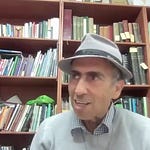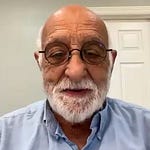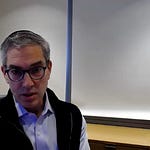I’ll be on book tour for Being Jewish After the Destruction of Gaza for the next couple of months. You’ll find a list of book-related events below.
I’m happy people are reading my book. But I know that many talented Palestinian authors don’t get the same attention. So, I hope people who buy my book also buy one by a Palestinian author. For instance, the latest work by the brilliant essayist, Raja Shehada, What Does Israel Fear from Palestine?
I hope readers also donate to people in Gaza. For instance, Hossam and Mariam Alzweidi, who were severely injured along with their four children by Israeli bombs and have been displaced ten times since October 7th. They’re trying to raise the money to seek medical care in Egypt. Their GoFundMe page is here.
Book Tour
(We’ll update this every week.)
On Monday, April 28, I’ll be speaking at Princeton University.
On Tuesday, April 29, I’ll be speaking twice in Washington, DC: with Khaled Abu El Fadl at Noon at Georgetown University and at 6 PM with Mehdi Hasan at Busboys and Poets.
On Wednesday, April 30, I’ll be speaking with Barnett Rubin via Zoom to the Willoughby Wallace Memorial Library.
On Sunday, May 4, I’ll be speaking at Kehilla Synagogue in Oakland/Piedmont, California.
On Monday, May 6, I’ll be speaking at Stanford University.
On Monday, May 12, I’ll be speaking at Parkdale Hall in Toronto.
On Tuesday, May 13, I’ll be speaking at the Woodstock Jewish Congregation.
On Sunday, May 25, I’ll be speaking with Debbie Whitmont at the Sydney Writers Festival in Sydney, Australia.
On Tuesday, May 27, I’ll be speaking at the Wheeler Center in Melbourne, Australia.
Book Reviews
Being Jewish After the Destruction of Gaza was discussed in The New York Times. I was interviewed about the book for Sojourners and Current Affairs. The Harvard Crimson wrote about my recent talk there.
Sources Cited in this Week’s Video
The justification for suspending the Harvard Divinity School’s Initiative on Religion, Conflict and Peace.
Things to Read
(Maybe this should be obvious, but I link to articles and videos I find provocative and significant, not necessarily ones I entirely agree with.)
In Jewish Currents (subscribe!), Jon Danforth-Appell argues for organizing for Palestinian rights as Americans, not Jews.
Wesleyan’s President rejects Trump’s justification for cracking down on universities.
Why universities must take Trump to court.
The extremely talented Rachel Shabi, author most recently of Off White: The Truth about Antisemitism, has launched a Substack.
See you on Thursday and Friday,
Peter
VIDEO TRANSCRIPT:
So, I was invited to give a talk about my book at the Harvard Divinity School. I gave it last a week. And something strange happened. This has never really happened to me before, which is that I was invited to give this talk at the Harvard Divinity School under a program at the Divinity School called the Religion, Conflict and Peace Initiative. And in between the time I was invited and the time I gave the talk, the news broke that this initiative, this entire program at the Divinity School is being closed down. And the scholar who invited me, a really terrific scholar, will no longer be able to continue in that position. And this came as a result of the pressure from the Trump administration and from donors and from elements in the organized American Jewish community claiming this program, the Religion Conflict and Peace Initiative, is biased. That it’s one-sided. It focuses a lot on Israel and Palestine. Students go and visit Israel and Palestine. The claim is it’s one-sided because evidently it doesn’t have enough Zionist representation in the program.
And I think this is significant because I think this rationale is going to be used for a lot of the efforts to basically destroy academic programs or kind of take control of universities by the Trump administration, by other forces that want to kind of push them to the right. And the claim is going to be, well, we just want these universities to have more diversity of viewpoints. We don’t want them to be so one-sided in their views. And I think this is especially going to be true on Israel and Palestine. The claim is going to be that these programs need to get rid of a bunch of these anti-Zionist professors, or bring in a bunch of pro-Israel professors, or close down programs that are ‘one-sided.’ And the claim will be that people really just want a diversity of viewpoints, which on the face of it sounds good. Why wouldn’t we want things to be balanced?
But when you think about it, actually, this argument really makes no sense at all, right. Universities are supposed to be efforts at gaining the truth, right. Harvard’s motto is veritas, truth, right. So, scholars in a particular discipline are aiming for what they consider to be the truth, right. So, in physics, over time, scholars reject certain kinds of ideas about the way physics works and embrace others. And a consensus emerges about the way something in physics happens, right. And you’re not looking for balance between these two competing perspectives because once scholars have decided that one perspective, one way of thinking about physics is closer to the truth, right, that you hire scholars who are doing work in that area, right, not in something which is basically not considered to have any scholarly validity to it, right.
And it’s not really that different when you’re thinking about the social sciences, right. So, let’s take the situation of the treatment of the Roma, right, colloquially they’re called gypsies in parts of Europe, right. I think that the scholarly consensus is that the Roma have been brutally oppressed in these countries. And so, I think you’d be really hard pressed to find scholars who actually think that the Roma have been treated pretty well in the countries in Europe in which they’ve lived, right. So, you could say this is a biased perspective, right? Where are the voices saying that the countries like Hungary and Romania and other Eastern Europe countries have actually done a great job treating their Roma very well, right. Nobody says that we need that to balance it because it’s not where scholars, who are doing research on the ground, it’s not where they believe truth lies, right.
And this would be the case in, I think, almost any situation in which there is evidence of systematic oppression, right. You’re not going to find among people at universities who study Myanmar’s treatment of the Rohingya, you’re not going to find a lot of scholars who think that Myanmar has been treating the Rohingya really well, right. That the Rohingya should be thankful for the way that they’ve been treated. You’re not going to find a lot of scholars who study the way the Indian government, particularly these days, is treating its Muslim population, who think that the Narendra Modi government is treating Indian Muslims in a really fair and equal way, right, because that’s not what scholarly research actually would lead one to believe, right.
And it’s the same on Israel-Palestine, right? In American political discussion, there may be lots of people who think that Israel’s treatment of the Palestinians is just fine, or that if there are problems, basically they’re only because the Palestinians brought them all on themselves, right. But scholars who actually go and look and spend time in the West Bank or in East Jerusalem or in Gaza looking at the lives of Palestinians under Israeli control generally don’t come to those conclusions, right. They come to the kinds of conclusions that the human rights organizations, which also do this research on the ground, have found, including the Israeli human rights organizations, which there’s a profound oppression there. And then they try to understand the dynamics of the oppression, how it plays itself out, why historical events turned the way they are, right.
So, under those circumstances, it just doesn’t make any sense for a scholarly enterprise to have to bring in a bunch of, you know, ‘pro-Israel’ or Zionist perspectives, right, if those perspectives are simply not what scholars have decided is actually the truth of the situation as best they can understand it. Now, scholars are not infallible, right. Scholars can be wrong. Scholarly consensuses get overturned in all kinds of fields in different ways. But the point is that there’s a process by which that happens, right, in which people who have devoted their lives to studying these things then write dissenting views and they get debated. And sometimes those dissenting views win out and it changes the way people in a particular discipline view something. And that’s great. That’s the way it’s supposed to be.
But certainly not for a bunch of non-academics, right. Politicians, big donors who work at hedge funds, right, people, you know, in the American Jewish establishment organizations who have no scholarly background in the subject at all will just decide that these programs are not even handed as they define them, right. That’s like a farce of a way of a university would proceed in any subject, right. It makes about as much sense as telling people that the people at Exxon should be able to take the people who are studying climate at Harvard to basically say, well, it doesn’t seem like we have enough people who are saying that actually fossil fuels are good for the environment. It’s an absurd position for a university to take.
But this is the pressure that’s being put on universities. And because Palestinians are so politically demonized in the United States, this is an area on which the university seemed willing to make these capitulations. And I think it’s not only morally wrong, I think it’s really a betrayal of the scholarly purpose of the university. I’m glad to see that as of today when I’m taping this on Wednesday, Harvard University is pushing back against the Trump administration in some ways. But this, it seems to me, was a really shameful capitulation. And I fear that there will be more of these kind of capitulations in the name of even-handedness in the days to come.








